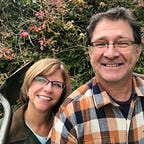A Poem For Middlers — Many Will Like But Some Won’t
By my friend, Bug Stu, about our Bayesian reality (trending)
(Revised 11/1/21) This poem pertains to those who are so certain about their sociological assumptions of past causes and future effects that there’s only one dimension in political prescriptions: Left/Right. But our Bayesian Inferences need to be allowed to grow if we’re going to get this right for our grandkids, it seems reasonable to say.
Another of the Cursory Rhymes for our Curious Times
Bug Stu on the Bayesian Awakening
Do you mind…if I lose my mind?
Or loose my mind…for a reason?
Step out of the Fray, and get far away?
With no charges of “traitor” or “treason”?
Can you, yes you, set aside “What is true”
and rebuild in that Bayesian way?
From the land of Kent, wondering he went,
thirty years after Newton’s last day.
Overlooked as we view The Enlightenment,
and Bayes died, but his papers would say:
(In a way)
We live in a probab…listic world
with few absolutes
from the heavens hurled.
The Hows and the Whys
don’t appear from our eyes
but our minds,
in a stark absolutist disguise.
Middlers and FiDdLers
can still hear his call.
This is not about “freedom”
or a free-for-all.
It’s not about serpents
and blaming The Fall.
It’s not philosophical falderal.
Bayes…explained Isaac Newton’s
new math,
perhaps-that was his path
to his theorem.
By Hume or whomever,
inspired to face wrath,
he laid out his points
knowing many would smear them.
Hard Left or Hard Right,
I give Bayes my thanks,
when you try as you might,
and you railroad your ranks.
More of “what’s true”
must come into view,
so-you-don’t destroy more
with your torches…or tanks.
Go get the whole story,
get away from the poles,
to the Middle,
to the deep long Meridian.
Add some Stralfs and some bugs
and some rabbit…holes,
inspect “Is”, and qualify the quotidian.
(Added 11/1/21) Our brains, set in a complex and uncertain sense of reality, do Bayesian Inferring constantly, under our conscious thought. This is how those human-beating AI machines work too. Bayesian updating refers to the addition or improvement of information fed into our cloud of possibilities, improving the odds we’ll get something right (although never really guaranteeing it, and things are always changing). Our current dominant and divisive discourse doesn’t support Bayesian updating.
David Hume is mentioned in the poem, and that can raise concerns for many traditional religious people, since one of Hume’s concerns was that religious people even existed, you could say. But really, in the broadest sense, we’re all religious people when you dig deep into one’s Whys and into uncertainty, heuristics, and reason.
Take away the politicized brands of ethics and caring, and we farmers of the pale blue dot in the sky are all following some living or dead clerics with teachings about The True Good and deciding whether the god or goddess is inside of, or outside of, our bodies, and what we deserve, as if that too is more than a word from marketers and political shepherds. (Maybe it is, or was, but we probably need to look deeper at it.)
Even though most of what you find on Bayes’ Theorem looks math-y, that’s not the most important thing. Anil Seth’s Being You and Judea Pearl’s/Dana Mackenzie’s The Book of Why have good explanations. But here’s something quick worth watching.
